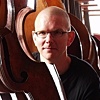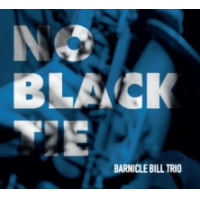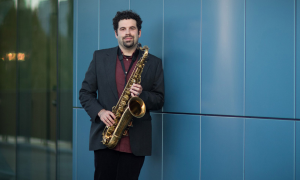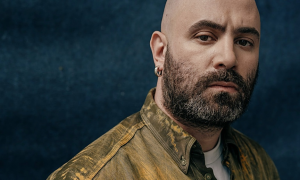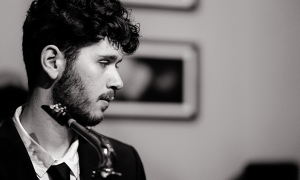Home » Jazz Articles » Take Five With... » Take Five With Martin Zenker
Take Five With Martin Zenker

Martin Zenker was born in Munich and has been a freelance bassist since 1987. Performance credits include Jimmy Cobb, Billy Hart, James Moody, Jim Snidero, Steve Grossman, Barbara Morrison, Peter King, Don Braden and many more. Now based in Hamburg, he was Professor of Bass and Jazz History in Seoul, South Korea from 2008 to 2012.
Instrument(s):
Bass.
Teachers and/or influences?
Every good bassist, from Pops Foster to Larry Grenadier, along with a lot of other people! Personally, I owe a lot to a few drummers, notably Rick Hollander and Billy Hart.
I knew I wanted to be a musician when...
I was six or seven years old. I knew I wanted to be a bassist when I heard Percy Heath around 1982.
Your sound and approach to music:
I prefer human made and acoustic music. But anything that's good and honest is welcome.
Your teaching approach:
Get your tools together, but don't forget that it is always your story and you are the only relevant judge to your music. Don't cheat yourself!
Your dream band:
Too many to mention and I've worked with some of them in the past. I would like to play more in a big band.
Road story: Your best or worst experience:
Also too many to mention because I've spent a lot of time on the road, but one is Jazzfestival Mongolia. Five minutes before the gig, the fingerboard of the only upright bass in town came off. I took the strings, put some scotch tape around, put the strings on again, and played the gig. I didn't play too many bass solos that night— which wasn't a bad thing.
Favorite venue:
I choose my favorite places by the personality of the promoters, and some of them are really great friends and supporters. L'Archiduc in Brussels, Palm and Evans in Seoul, Unterfahrt in Munich, The Jazzbar in Edinburgh, and many others.
Your favorite recording in your discography and why?
I guess Live In Shanghai (Mons, 2007) by Ugetsu, partly because of the trip and the recording circumstances. Route F (Enja, 2009) by Billy Hart is another one for it's honest and direct approach to the music.
The first Jazz album I bought was:
The first one I listened to was We Get Requests (Polygram, 1964), by the Oscar Peterson Trio, this made working on a record with Ed Thigpen very special. The first one I bought was Modern Jazz Quartet's Live at Avery Fisher Hall, which made me start playing bass. A few years ago I had a chance to play a few notes on Percy Heath's old bass—it was a very emotional moment.
What do you think is the most important thing you are contributing musically?
Myself.
Did you know...
I also run marathons to keep a healthy balance and I am fan of FC Bayern Munich.
CDs you are listening to now:
Everything from Carmen McRae to Dexter Gordon, plus many more.
Desert Island picks:
Abbey Lincoln, Abbey Is Blue (OJC);
The Jazz Messengers, Ugetsu (Riverside);
Bobby Timmons, In Person (Riverside);
John Coltrane, Ballads (Impluse!)
Dexter Gordon, Go (Blue Note).
What are some of the essential requirements to keep jazz alive and growing?
Diverting money from education to venues is one thing. Taking off the pressure to create something "new" every three months. We can't reinvent jazz every six months. Give it some time to develop.
What is in the near future?
Quite a lot. Couple of new releases with European and Asian bands, a couple of tours in Asia and Europe, and a few trips to Ulan Batar, Mongolia. You can follow it on my website.
What's your greatest fear when you perform?
A bad drummer.
What song would you like played at your funeral?
Maybe Ernestine Anderson's version of "Old Folks," with Ray Brown, Monty Alexander, and Frank Gant—with the whole two choruses of lyrics: "Some day there's gonna be no more old folks! What a quiet little town this will be! Children's voices at play will be still for a day. The day, they take Old Folks away" I start crying every time I hear it! But ask me again in twenty years.
What is your favorite song to whistle or sing in the shower?
Even though I haven't really played it for about twenty years and haven't listened to the recording for quite a while, it seems Wayne Shorter's "Marie Antoinette" has been stuck in my head since I first played it in 1990 with Tim Armacost.
By Day:
I would call everything that comes along with being a musician a day job. From administration and organizing trips to booking gigs and so much more.
If I weren't a jazz musician, I would be a:
Being a striker in FC Bayern would be something I would trade instead of being a bassist— but I might be too old for that now.
Tags
Martin Zenker
Take Five With...
Germany
Hamburg
Jimmy Cobb
Billy Hart
James Moody
Jim Snidero
Steve Grossman
Barbara Morrison
Peter King
Don Braden
Pops Foster
Larry Grenadier
Rick Hollander
Percy Heath
oscar peterson
Ed Thigpen
Modern Jazz Quartet
Carmen McRae
Dexter Gordon
Abbey Lincoln
The Jazz Messengers
Bobby Timmons
John Coltrane
Ernestine Anderson
Ray Brown
Monty Alexander
Wayne Shorter
PREVIOUS / NEXT
Support All About Jazz
 All About Jazz has been a pillar of jazz since 1995, championing it as an art form and, more importantly, supporting the musicians who make it. Our enduring commitment has made "AAJ" one of the most culturally important websites of its kind, read by hundreds of thousands of fans, musicians and industry figures every month.
All About Jazz has been a pillar of jazz since 1995, championing it as an art form and, more importantly, supporting the musicians who make it. Our enduring commitment has made "AAJ" one of the most culturally important websites of its kind, read by hundreds of thousands of fans, musicians and industry figures every month.


